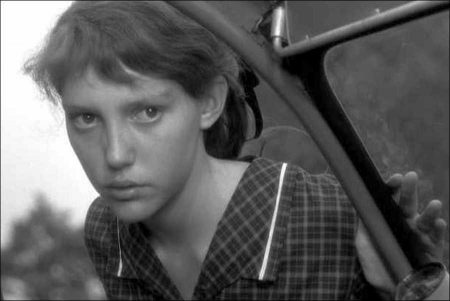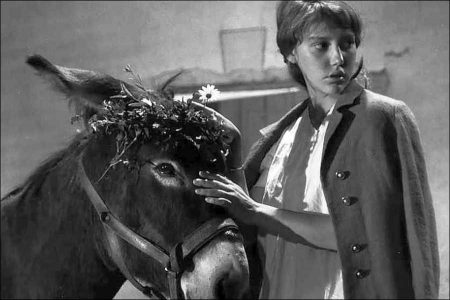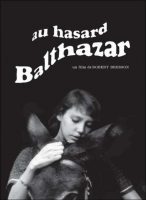Au Hasard Balthazar follows the life of the donkey Balthazar as he passes from owner to owner, many of them treating him cruelly, all of them are beyond his pure and simple comprehension. His sad predicament as a beast of burden parallels the life of his first human owner, Marie, who, like Balthazar suffers the sins of man. Balthazar is a noble creature, however, and he accepts his fate with grace. The film is a parable of virtue & purity. It is a narrative of transcendence in a life of burden.
Au Hasard Balthazar, also known as Balthazar, is a 1966 French tragedy film directed by Robert Bresson. Believed to be inspired by a passage from Fyodor Dostoyevsky’s 1868–69 novel The Idiot, the film follows a donkey as he is given to various owners, most of whom treat him callously. Noted for Bresson’s ascetic directorial style and regarded as a work of profound emotional effect, it is frequently listed as one of the greatest films of all time.
The film premièred at the 1966 Venice Film Festival where it won the OCIC (International Catholic Organization for Cinema) Award, the San Giorgio Prize, and the New Cinema Award.
About the Story
In the French countryside near the Pyrenees, a baby donkey is adopted by young children – Jacques and his sisters, who live on a farm. They baptize the donkey (and christen it Balthazar) along with Marie, Jacques’ childhood sweetheart, whose father is the teacher at the small school next door. When one of Jacques’ sisters dies, his family vacates the farm, and Marie’s family take it over in a loose arrangement.
The donkey is given away to local farmhands who work it very hard. Years pass until Balthazar is involved in an accident and runs off, finding its way back to Marie, who is now a teenager. Marie’s father gets involved in legal wrangles over the farm with Jacques’s father, and the donkey is given away to a local bakery for delivery work.
Gérard, leader of a young criminal gang, is the delivery boy at the bakery. He is jealous of Balthazar because Marie loves him, and takes charge of the donkey, treating it cruelly. Marie, driving a 2CV one day, sees the donkey at the roadside and stops to greet it. Gérard, who’d been sleeping nearby, gets into her car and refuses to leave when demanded. It is implied that Gérard sexually assaults her after she gives up on attempting to flee, and afterwards she drives home.
Marie enters into an abusive relationship with the violent Gérard, leaving her parents. Gérard is summoned to the local police station and questioned about a murder along with Arnold, an alcoholic who is also a suspect. Neither is arrested. Gérard and his gang assault Arnold, calling him a murderer and a stool-pigeon. Balthazar becomes ill and is nearly euthanized, but Arnold interrupts and takes the donkey off their hands.
Balthazar recovers and Arnold uses the donkey and another to guide tourists around the Pyrenees. When the season ends, Balthazar escapes and joins a circus. But when the donkey sees Arnold in the audience it goes berserk, and Arnold retrieves it. Arnold’s uncle dies and he inherits a fortune. He throws a wild party at a bar, at which Marie and her mother talk and she is asked to come home, which Marie refuses to do.
Gérard puts Arnold on Balthazar’s back to ride home. However, he is so drunk he falls off, hits his head on the ground and dies. The police send Balthazar to market. An avaricious local miller buys the donkey, using (and abusing) it for pumping water and milling. One rainy night, Marie, soaking wet, knocks on the miller’s door asking for shelter – she has run away from Gérard.
The miller says he’ll be her companion and help her to escape, as she confided in him that she wished to “run away” – but the next morning sees her parents and offers them the donkey, the implication being that Marie will follow. Marie goes back to her parents.
Jacques visits, wanting to marry her, and when Marie tells him about the abuse she has suffered he does not change his mind. Jacques also says that his father does not want the money the court ordered Marie’s father to pay him. Marie is conflicted and is not sure if she is angry with Jacques or if she wants to be with him. She says she wants to “have it out” with Gérard and goes to visit a barn where they used to meet. Gérard is there with his gang, and they strip her, beat her, then lock her in.

Au Hasard Balthazar (1966)
Directed by: Robert Bresson
Starring: Anne Wiazemsky, Walter Green, François Lafarge, Philippe Asselin, Nathalie Joyaut, Jean-Claude Guilbert, Pierre Klossowski, Jean-Joel Barbier, François Sullerot, Marie-Claire Fremon
Screenplay by: Robert Bresson
Production Design by: Pierre Charbonnier
Cinematography by: Ghislain Cloquet
Film Editing by: Raymond Lamy
Art Direction by: Jean Catala, Dominique Ribeyrolles
Music by: Jean Wiener
MPAA Rating: None.
Distributed by: Cinema Ventures
Release Date: May 25, 1966
Visits: 14

